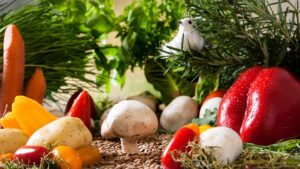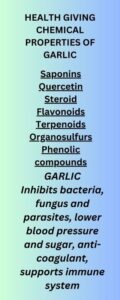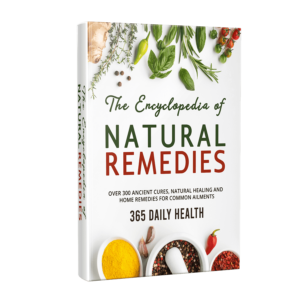Introduction:

Garlic, known scientifically as Allium sativum, has fascinated people for centuries due to its remarkable medicinal properties and culinary uses. This pungent bulbous herb belongs to the onion family and has played a significant role in traditional medicine across the globe. In this article, we will explore the extraordinary medicinal properties of garlic, highlighting its medicinal compounds while uncovering common historical home remedies that have harnessed its healing power.

Nutritional Value of Garlic:
Garlic boasts a rich array of essential nutrients that contribute to its medicinal potency. It contains vital vitamins, including vitamin C and B6, as well as minerals such as manganese and selenium. Additionally, garlic serves as an excellent source of allicin, a sulfur compound responsible for many of its health benefits. Allicin, released when garlic cloves are crushed or chopped, exhibits potent antimicrobial and antioxidant properties.
Allicin: Nature’s Antibiotic:
One of the key medicinal compounds found in garlic is allicin. Allicin possesses broad-spectrum antimicrobial properties, effectively combating bacteria, viruses, fungi, and parasites. It acts as a natural antibiotic, inhibiting the growth and replication of harmful microorganisms. By incorporating garlic into your diet or using garlic-infused remedies, you can help fight infections and promote overall health.
Sulfur Compounds:
Garlic contains various sulfur compounds that contribute to its medicinal benefits. These compounds, such as diallyl sulfide, diallyl disulfide, and diallyl trisulfide, exhibit antioxidant and anti-inflammatory properties. They aid in reducing oxidative stress, combating inflammation, and enhancing garlic’s cardiovascular benefits.
Ajoene: A Potent Anticoagulant:
Derived from garlic, ajoene is a sulfur-containing compound known for its anticoagulant properties. It helps prevent blood clot formation by inhibiting platelet aggregation. Extensive research has focused on ajoene’s potential in reducing the risk of thrombosis and improving blood circulation.
Quercetin: A Powerful Antioxidant:
Garlic contains quercetin, a flavonoid with potent antioxidant and anti-inflammatory properties. Quercetin plays a vital role in neutralizing harmful free radicals, protecting cells from oxidative damage. Furthermore, its anti-inflammatory properties contribute to garlic’s ability to reduce inflammation and support overall health.
Organosulfur Compounds:
Renowned for its high concentration of organosulfur compounds, garlic has been studied for its potential anticancer effects. Among these compounds is S-allyl cysteine (SAC), which exhibits antioxidant properties and may help inhibit the growth of cancer cells.
Incorporating Garlic into Your Diet:
To harness the health benefits of garlic, consider adding it to your daily meals. It can be used in various dishes, including soups, stir-fries, sauces, and marinades. Additionally, you can explore garlic-infused remedies or consult with a healthcare professional for guidance on its supplemental use.
For more on the medicinal properties of herbs check here.
Conclusion:
Scientific studies indicate that garlic, along with many other foods, offers substantial medicinal benefits. By incorporating garlic into your diet and embracing its healing properties, you can promote overall well-being and enhance your health naturally.

